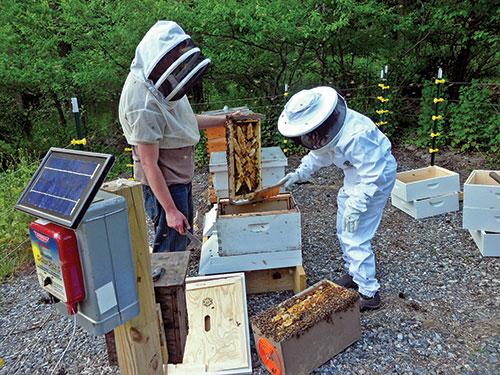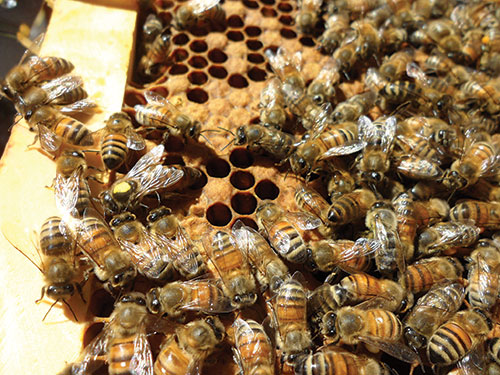When taking a walk on our property, many of our friends hesitate at the bee hives and ask “Why bees?” Some days we ask ourselves the same question. It seemed like a relatively easy way to farm. Pollinators are really important in the ecosystem. Approximately 1/3 of all human food consumed has been pollinated by honey bees! Honey is tasty and easy to prepare for sale. And how hard can little insects be(e)?
Over the last three seasons, my husband and I (mainly him) have learned the art of beekeeping. We began early one spring with two packs of bees. Yes, bees come in three-pound packages – of approximately 10,000 individuals per pack. This is your starter colony. A queen comes along and is gradually introduced to the worker bees over a period of about seven days. Once the queen and drones mate, eggs are laid. Most become workers and some become drones (male bees). There are job assignments and everyone pulls their load. A fully populated hive can have 60,000 bees! Once the hive begins to function efficiently, it may take 2-3 seasons to see your first harvest of honey.

However, like any type of farming, beekeeping comes with its challenges. Weather is important. If it’s too wet or too cold at certain key times, then flowers may not be in bloom when bees need pollen (protein) and nectar (sugars). This happens when it’s too dry, too, and key nectar sources stop producing. Weather has to be just right to provide bees with their food source so that they can produce honey – both for themselves and for us. Two winters ago, we experienced a very mild December and January. Bees became active and left the hive. What they found on the outside was a lack of nectar (it was winter, after all). The problem was that they expended a lot of energy journeying out from the hive and had to eat more of their stored honey at a quicker rate. Many beekeepers in the northeastern part of the country did not realize this was happening and by the time they caught on, the bees had eaten themselves out of house and hive and starved. Bees can be fussy eaters too. Even if you feed the bees in winter, sometimes they can be inches away from food but will not go to it. When that happens, all you can do is start again in the spring with new bees.
Other challenges beekeepers face with their hives include mites, pests, wax moths, mice and larger furry critters – most notably, bears. In this part of the country, to insure a successful hive, one must utilize electric fencing to keep bears from realizing their sweet tooth. This is an added cost one must factor into successful beekeeping. And speaking of costs, it’s not cheap to start a beekeeping operation. In addition to the hives (and there are many parts to them), you need a beekeepers suit, tools of the trade and then extracting equipment for the harvest. The suit is important – it is white and covers all body parts to protect you from stings. White is a calming, non-threatening color for bees.

Honey bees are rather friendly. I was a bit concerned having all these many thousands of bees in proximity to my vegetable garden since I spend considerable time out there for five months of the year. I didn’t want to increase my chances of getting stung. Not to worry – in three years there hasn’t been a human/honey bee interaction in the yard! The bees go about their business of pollinating my plants and gathering their pollen and nectar to bring back to the hive to make the honey we all need. Once your bees are providing you honey, you have several choices. You can eat it all yourself (or share with family and friends) or you can sell it. Honey is a popular product at local farmers markets and farm stands. With the strengthening of the Buy Fresh, Buy Local movement, there has been considerable support of these local markets that provide great opportunities for our farmers.
Honey bees have become my friends and can become yours, too, should you want to become beekeepers. Our suggestion would be to reach out to the New Jersey Beekeeper Association and find a mentor to teach you who has experience. Read books, take classes and dream of a rich honey flow!
Read about local beekeepers...